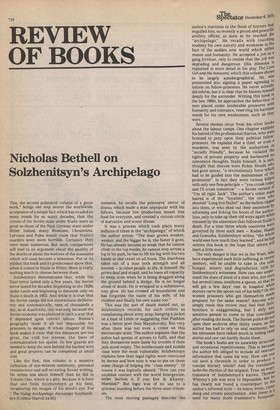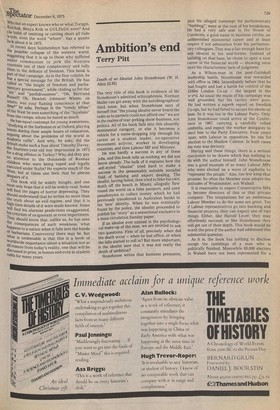Nicholas Bethell on Solzhenitsyn's Archipelago
This, the second published volume of a great work,* brings one step nearer the worldwide acceptance of a simple fact which has evaded so many minds for so many decades, that the crimes of the Soviet state under Stalin were as great as those of the Nazi German state under Hitler. Indeed, many Russians, Ukrainians, Latvians and Poles would claim that Stalin's murders were more horrible. Certainly they were more numerous. But such comparisons will lead to an argument about the quality of the deaths or about the motives of the massacre which will soon become a nonsense. Put at its mildest this book and its predecessor show that, when it comes to Stalin or Hitler, there is really nothing much to choose between them.
Solzhenitsyn demonstrates that, while the Nazi terror lasted only a few years, the Soviet terror lasted for decades, beginning in the 1920s under Lenin and beginning to diminish only on Stalin's death in 1953. And while it is true that the Soviet camps did not exterminate deliberately and systematically, tens of thousands a day, as at Auschwitz, this was only because the Soviet economy was planned in such a way that it depended upon convict labour. Russia's geography made it all but impossible for prisoners to escape. A whole chapter of this book makes it clear that the distances are too great, the cold too intense, the lines of communication too sparse. So few guards are needed to keep the men behind the barbed wire and great projects can be completed at small cost.
Like the first, this volume is a massive collection of eye-witness testimony, personal reminiscence and self-revealing Soviet writing. He writes less about himself than he did in Volume One, which is a pity, because it is here that one finds Solzhenitsyn at his best, recapturing the images of his mind's eye. For * The Gulag Archipelago Alexander Solzhenitsyn (Collins/Harvill £4.95)
instance, he recalls the prisoners' terror of illness, which made a man unpopular with his fellows, because low production meant less food for everyone, and created a vicious circle of starvation and worse illness.
It was a process which took place many millions of times in the "archipelago" of which the author writes: "The man grows weaker, weaker, and the bigger he is, the faster it goes. He has already become so weak that he cannot climb to the top bunks, he cannot step across a log in his path, he has to lift his leg with his two hands or else crawl on all fours. The diarrhoea takes out of a man both strength and all interest — in other people, in life, in himself. He grows deaf and stupid, and he loses all capacity to weep, even when he is being dragged along the ground behind a sledge. He is no longer afraid of death. He is wrapped in a submissive, rosy glow. He has crossed all boundaries and has forgotten the name of his wife, of his children and finally his own name too."
This was the sort of death meted out, as Solzhenitsyn records, for such crimes as complaining about army soup, hanging a jacket on a bust of Lenin or suggesting that Pushkin was a better poet than Mayakovsky. But very often there was not even a crime on this microscopic scale. The author explains that the police had quotas of arrests to fulfil, and that they themselves were liable for trouble if their jails stood empty. The intellectuals and middle class were the most vulnerable. Solzhenitsyn explains how their legal rights were restricted by decree and how easy it was to pin on them some charge of helping the "class enemy". Of course it was logically absurd: "How can you establish contact with the world bourgeoisie, under Section 4, if you live in KhantyMantiisk?" But logic was of no use to a prisoner standing before the three-man tribunals.
The most moving passages describe the
author's reactions to the flood of horrors that engulfed him, so recently a proud and powerfal artillery officer, as soon as he reached the "archipelago". He recalls with touching modesty his own naivety and weakness in the face of the sudden new world which defied reason and humanity. He accepted a job as a gang foreman, only to realise that the job was degrading and dangerous. (His dilemma is explained in more detail in his play The Love Girl and the Innocent, which this volume shows to be largely autobiographical. He was pressurised into signing a paper agreeing to inform on fellow-prisoners. He never actuall) did inform, but it is clear that he blames himself deeply for the surrender. Writing this book in the late 1960s, he approaches the behaviour.' men placed under intolerable pressures with humanity and tolerance, reserving his harshest words for his own weaknesses, such as they were.
Several themes recur from his other books about the labour camps. One chapter explains his hatred of the professional thieves, who were licensed to prey upon their political fellow prisoners. He explains that a thief, or even a murderer, was seen by the authorities as "socially friendly", because he violated the rights of private property and harboured n° subversive thoughts. Stalin himself, it is gad' thought that thieves were Robin Hoods wh° had gone astray, "a revolutionary force which had to be guided into the mainstream of the proletariat". In fact they were vicious killers with only one firm principle — "you croak todaY and I'll croak tomorrow" — a Soviet version r.)1. "I'm all right Jack". The author's other Mal° hatred is of the "loyalists", the ones Nvh°,, shouted "Long live Stalin!" as the bullets riPPeu into them, or who eked out their sentences hY informing and licking the boots of the authorities, only to take up their old ways again Whe," released by the amnesties that followed Stalin death. For a time three whole countries were governed by three such men — Kadar, and Gomulka. Solzhenitsyn writes, "the who': world sees how much they learned", and he ha' written this book in the hope that others Noll learn a little more.
The only danger is that we in the West, W11°, have experienced such little suffering in recem memory, will be unable to take in the cold' hunger, misery and degradation told laY Solzhenitsyn's witnesses. How can one under" stand the state of mind of a man who, not on but several times, swallows a spoon, so that he will get a few days' rest in hospital While doctors carve the spoon out of his belly? Or the women prisoners who get themselves made pregnant for the same reason? Anyone Wh° simply reads this review may feel that Solzhenitsyn is exaggerating, but I defy anY sensitive person to come to that conclusion after reading the book. The Soviet police do n°t open their archives after thirty years, so lhet author has had to rely on oral testimony, 1:ai his witnesses have risked much in telling their stories and one can hardly doubt them. The book's faults are its unwieldy structal.ee and occasional repetitiveness. This is beca0s. the author felt obliged to include all relevara information that came his way. How can age cut such a chronicle in order to produce. 3 concise literary whole? And the translation lacks the rhythm of the original. True, as everY.. translator of Solzhenitsyn's knows, Thon-la: Whitney's job was next to impossible, but 11.5 has clearly not found a counterpart to hl author's informal style — its heavy irony, ca.°, slang and erratic punctuation. Also there is need for many more translator's footnotes.
Who but an expert knows who or what Torsgin, Kolchak, Benya Krik or GULZhDS were? And the habit of omitting or cutting short all rude words, even the word "whore", has a quaint look about it in 1975.
In recent days Solzhenitsyn has referred to the possible collapse of the western world, suggesting that it is up to those who suffered under communism to jerk the Western countries out of their complacency and rally them to the defence of freedom. This book is Part of that campaign. As in the first volume, he has a special message for the British. He has called us "the height of freedom and parliamentary government", while chiding us for our "sin" and "perfidiousness". "Oh, Bertrand Russell! Oh, Hewlett Johnson! Where, oh Where, was your flaming conscience at that tirne?" he asks. Perhaps in the "trendy lefties" Of the West he sees something of the "loyalists" from the camps, whom he hated so much. He has equal contempt for young westerners, "studying at the Sorbonne or at Oxford, playing tennis during their ample hours of relaxation, arguing about the problems of the world in students cafés". And why, he asks, did the British make such a fuss about Timothy Davey, the fourteen-year-old boy imprisoned in 1972 for a drug offence in Turkey? Why did they pay 110 attention to the thousands of Russian children who were being raped and legally executed under Stalin? He expects much of the West, but at times one feels that he almost despairs of it.
This book will be widely bought, and one must only hope that it will be widely read. Some Will find the pages of horror depressing. They should understand that he writes no more than the truth about an evil regime, and that it is high time details of it were made known. Some Nv. find his alarmist predictions exaggerated, his criticism of us ignorant or even impertinent. They should know that, unlike us, he has seen
the consequences of such weakness, what haFF r—e
ns to a nation when it falls into the hands
of barbarians. Controversy there may be, but What is undeniable is that this is a book of worldwide importance about a situation not at all remote from today's reality, one that will be discussed in print, in homes and even in student cafes for many years.


































 Previous page
Previous page